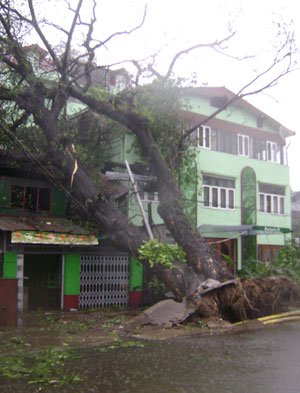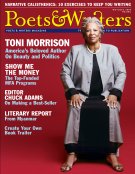I am in Yangon, the largest city of Myanmar, for only three days before Cyclone Nargis sweeps across the country, driving a tidal surge inland from the Bay of Bengal, killing nearly 85,000 people, and displacing as many as 800,000. But before the cyclone strikes, before the streets are flooded and the electricity goes out and the phone lines are knocked down by huge trees pulled from the ground, I travel the countryside to get a glimpse of everyday life in this Southeast Asian country, which, with no official warning of the storm from the government, is quiet and calm.

I cross the Yangon River on a ferryboat and accept a guided tour from a gregarious and enterprising bicycle rickshaw driver named Kyi. Rectangular ponds for fish farming dot the right side of a narrow road. The ponds are surrounded by tall, leafy trees: acacias, tamarinds, and palms. Farther back sit wood huts with corrugated tin roofs. Hopping off the rickshaw, I follow Kyi down a brick path that's disappearing into the dry soil, beneath some nutmegs, to an open market.
"Can I take a picture?" I say, standing before a squatting, fly-covered man with a black eye and a butcher's knife. He's separating organs from a bluish white pile of cow innards. Kyi nods happily, but before I can raise my camera, a man wearing a blue jumpsuit steps out from behind a fish stall and clucks his tongue. Kyi tells me to put the camera away. Later, as we walk back to the road, I ask him who the man was. "Government informant," Kyi says blandly.
Any examination of the writing life in Myanmar, formerly known as Burma, must begin with a discussion of censorship and repression. In the Orwellian police state that is Myanmar—the country has been under military rule since 1962, when General Ne Win staged a coup that dismantled a civilian government—everybody is scared of the authorities, but to be a writer is to actively invite attention. The state censors must approve all printed matter. In order to encourage self-censorship, the authorities review written works after printing but before distribution. Anything they don't like must be removed, and if a censor doesn't like an entire book or issue of a magazine or newspaper, the whole print run is destroyed. Writers who attempt to subvert the system and hide messages in their work risk arrest. In January, when the poet Saw Wai hid a political message that criticized the current military dictator, Senior General Than Shwe, in a love poem, he was arrested and sent to Insein (pronounced "insane") Prison.
Foreign writers and journalists aren't permitted in the country. The American Center in Yangon (formerly Rangoon), a walled and guarded library and English language center affiliated with the American embassy (and heavily monitored by the Burmese secret police), invited Paul Theroux to come and read during the week I was in the country. According to my contacts at the American Center, Theroux accepted, but the government denied him a visa. Similarly, the author Roy Kesey had planned to join me and write an article of his own, but he admitted to being a writer when an embassy official called and grilled him about his visa application, and he was rejected. The writer Imma Vitelli, a foreign correspondent for the Italian Vanity Fair, applied to enter the country two weeks after I left but, like most journalists trying to enter the country to cover the aftermath of the cyclone, she was denied.
For my part, I wrote "teacher" in the box on the application that asked me to identify my profession, and I was granted a tourist visa. I spent the trip contacting writers on phones I presumed to be bugged, interviewing authors I presumed to be watched, and wondering when the authorities would seize me and put me on the next flight out. Sadly, I felt less conspicuous, and therefore safer, after the cyclone swept Yangon. With so much chaos and destruction, I assumed the security forces were too distracted to track me.
Now that I'm out of the country, I'm faced with a dilemma. How do I write about the things I learned without risking the lives of the Burmese authors who spoke with me? Previous Western writers have simply changed the facts to obscure their sources, but such efforts can end up sounding poorly researched and slightly incredible (when they are actually neither). Some of my interview subjects, unwilling to be intimidated, have allowed me to use their names, but I have tried to protect others by changing their names and other pertinent characteristics.
Despite its poverty and dispiriting censorship, Myanmar is a highly literate country. With a per capita income of less than two hundred dollars a year, it's one of the poorest nations on the planet, but 90 percent of its roughly fifty million citizens can read.
In Yangon, bookstores and magazine stands are ubiquitous. Sellers of secondhand books operate in open-air stalls along the sidewalks of Pansodan Street across from the brick clock towers of the colonial-era High Court building, which is surrounded by a twelve-foot-high chain-link fence and guarded by sentries. Plastic sheeting protects their stacks of books from the occasional rainstorm.









